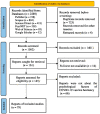What Contributes to COVID-19 Vaccine Hesitancy? A Systematic Review of the Psychological Factors Associated with COVID-19 Vaccine Hesitancy
- PMID: 36366286
- PMCID: PMC9698528
- DOI: 10.3390/vaccines10111777
What Contributes to COVID-19 Vaccine Hesitancy? A Systematic Review of the Psychological Factors Associated with COVID-19 Vaccine Hesitancy
Abstract
Vaccine hesitancy plays a crucial role in worldwide pandemic-control efforts. The multifaceted nature of vaccine hesitancy entails many psychological factors that are widely discussed in the literature, although few studies specifically compile these factors. Thus, this systematic review aims to synthesize the psychological factors contributing to vaccine hesitancy. As per the PRISMA (preferred reporting items for systematic reviews and meta-analyses) guidelines, a systematic search was conducted on electronic databases PubMed, Scopus, Science Direct, PsycNET, and Web of Science, and a manual search was conducted on Google Scholar. Out of the 2289 articles obtained, 79 studies that met the inclusion criteria were deemed eligible for the review. The findings highlight appraisals of the COVID-19 pandemic, vaccine safety and side effects, vaccine confidence/trust, trust in government and healthcare professionals, scepticism around vaccine production, conspiracy beliefs, emotions, and information and knowledge about the vaccine as the major psychological factors contributing to vaccine hesitancy. Concerningly, misinformation on COVID-19 vaccination spread through social media platforms, increasing vaccine hesitancy. Recommendations for government authorities, healthcare professionals, and implications for future research are also outlined.
Keywords: COVID-19; pandemic; psychological factors; systematic review; vaccine hesitancy.
Conflict of interest statement
The authors declare no conflict of interest.
Figures
References
-
- Thangaraju P., Venkatesan S. WHO Ten threats to global health in 2019: Antimicrobial resistance. Med. J. 2019;44:1150–1151. doi: 10.17826/cumj.514157. - DOI
-
- Pang J., Wang M.X., Ang I.Y.H., Tan S.H.X., Lewis R.F., Chen J.I.-P., Gutierrez R.A., Gwee S.X.W., Chua P.E.Y., Yang Q., et al. Potential Rapid Diagnostics, Vaccine and Therapeutics for 2019 Novel Coronavirus (2019-nCoV): A Systematic Review. J. Clin. Med. 2020;9:623. doi: 10.3390/jcm9030623. - DOI - PMC - PubMed
Publication types
LinkOut - more resources
Full Text Sources
Research Materials
Miscellaneous


